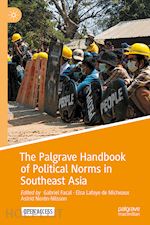
Questo prodotto usufruisce delle SPEDIZIONI GRATIS
selezionando l'opzione Corriere Veloce in fase di ordine.
Pagabile anche con Carta della cultura giovani e del merito, 18App Bonus Cultura e Carta del Docente
This open access handbook aims to constitute a reference point on political norm dynamics in Southeast Asia, by bringing together the array of normative repertoires that frame the possibilities for citizens to participate in, set agendas for, make decisions in, and contest, not only electoral and institutional politics but also informal and imaginary political spaces. It sheds light on intersecting political and social transformations and their consequences from the vantage point of political norms. While chapters lay out and analyse how political norms across Southeast Asia have been shaped in successive historical phases, the core of the handbook addresses current dynamics involved in defining and transforming political norms.
Part I. Introductory Part.- Chapter 1: Introduction - Political Norms in Southeast Asia: Overlapping registers and shifting practices.- Chapter 2: Institutional Pluralism and Interactions between Normative Systems: A theoretical overview.- Part II. Transnational Imprints on Political Norms.- Chapter 3: The Universal Declaration of Human Rights: A normative benchmark for Southeast Asia?.- Chapter 4: Normalising Authoritarianism: Authoritarian rule of law in Singapore and Hong Kong.- Chapter 5: The Draft Law on Association in Vietnam: Legal, political and practical norms under debate.- Chapter 6: Christian NGOs: From marginal liberation theologists to regional policy-shapers.- Chapter 7: Mapping the Transnationalisation of Social Movements through Online Media: The case of the Milk Tea Alliance.- Chapter 8: Does China have a Model to Export?, an Interview with Chloé Froissart.- Chapter 9: Human Rights Work in the ASEAN Intergovernmental Commission on Human Rights, an Interview with Yuyun Wahyuningrum.- Part III. Governmental Re-Orientations.- Chapter 10: The Mall and the Mosque: Conflicting norms in Brunei Darussalam.- Chapter 11: Timor-Leste: Constitutional provisions, political conventions and legitimacy under strain.- Chapter 12: The Singaporean Battlefield for the Chinese New World Order: Norms in the security domain.- Chapter 13: Lao PDR: The politics of stability in turbulent times.- Chapter 14: Authoritarian Fantasies and Democratic Aspirations: The Philippines after Duterte.- Chapter 15: Beyond Leftist-Phobia: Political prejudice and stigma in Indonesia.- Chapter 16: The Underbelly of Indonesia-China relations, Excerpts from an interview with Faisal Basri.- Part IV. Vernacular Institutions.- Chapter 17: What’s Asia Got to Do with It? “Asian Values” as reactionary culturalism.- Chapter 18: Military Norms in Southeast Asia: Comparing the cases of Thailand and Burma.- Chapter 19: Grounding the Shifting Political Registers in a Potent Cambodian Landscape.- Chapter 20: Moderate Islamic Organisations and Contestation over Political Theology: The responses by Nahdlatul Ulama and Muhammadiyah towards Islamism in Indonesia.- Chapter 21: The Rise of Indigenous Peoples Rights in Southeast Asia: Recent advances and current challenges.- Chapter 22: Khmer Buddhism and the Moderation of Political Power in Cambodia.- Chapter 23: Social Regulatory Regimes in Northern Vietnam: How interpersonal network norms, state laws and market rules interact.- Chapter 24: Malay Kingship in Contemporary Malaysia: From cultural legitimacy to social proficiency.- Chapter 25: Royalism in Cambodia Today, an interview with Prince Sisowath Thomico.- Part V. Against Orthodoxies.- Chapter 26: Photo Portfolio: Myanmar Streets of Protest.- Chapter 27: The Contested Domain of Political Space in Southeast Asia.- Chapter 28: Urbanised Villagers and Political Change in Southeast Asia, Duncan McCargo.- Chapter 29: Rhizomatic Protest, Generational Affinity and DigitalRefuge: Southeast Asia’s new youth movements.- Chapter 30: The Development of an LBT Movement in Indonesia: Post-reformasi identity politics.- Chapter 31: Making Claims Modestly: The norms and discourse driving land conflicts in rural Indonesia.- Chapter 32: The Bersih Movement and Political Rights in Malaysia, Khoo Ying Hooi.- Chapter 33: Awas Polisi! Anarchists and punks transgressing normative ‘politeness’ while resisting state repression in Indonesia.- Chapter 34: Human Rights Activism in Indonesia, an Interview with Usman Hamid.
Gabriel Facal is Deputy Director of the Research Institute on Contemporary Southeast Asia (IRASEC), Bangkok, Thailand.
Elsa Lafaye de Micheaux is Professor in Political Economy at the Institut National des Langues et Civilisations Orientales (INALCO), Paris, France.
Astrid Norén-Nilsson is a Senior Lecturer in the Study of Contemporary Southeast Asia at the Centre for East and South-East Asian Studies, Lund University, Sweden.











Il sito utilizza cookie ed altri strumenti di tracciamento che raccolgono informazioni dal dispositivo dell’utente. Oltre ai cookie tecnici ed analitici aggregati, strettamente necessari per il funzionamento di questo sito web, previo consenso dell’utente possono essere installati cookie di profilazione e marketing e cookie dei social media. Cliccando su “Accetto tutti i cookie” saranno attivate tutte le categorie di cookie. Per accettare solo deterninate categorie di cookie, cliccare invece su “Impostazioni cookie”. Chiudendo il banner o continuando a navigare saranno installati solo cookie tecnici. Per maggiori dettagli, consultare la Cookie Policy.